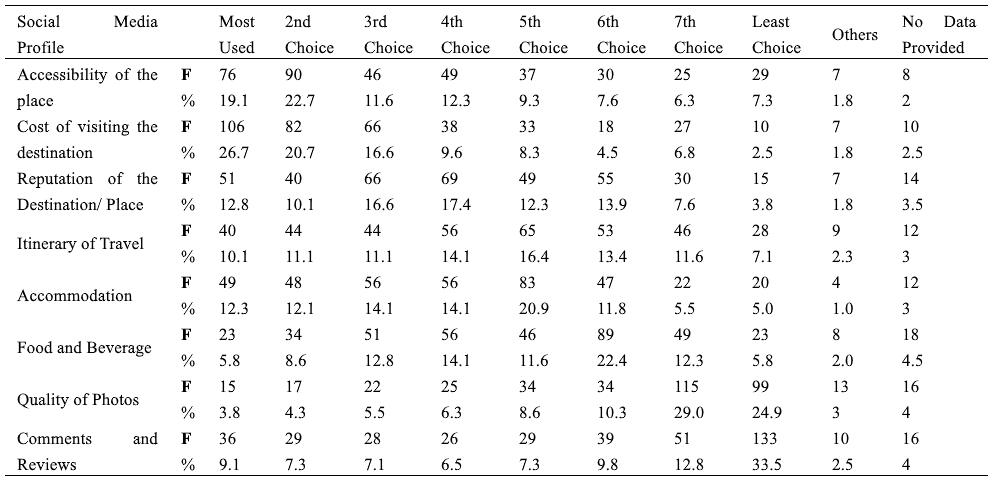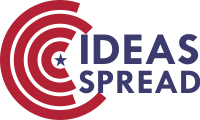Power of Social Media Usage Over Travelers' Choice of Tourist Destination
Abstract
Digital marketing thru the use of social media has been proven to be an effective tool to reach out to a wider audience. This study was conducted to determine the same effectiveness of social media as a medium for marketing a multi-faceted and highly diverse line of products in the tourism industry by identifying the power of social media usage over the travelers’ choice of tourist destinations.
With the descriptive correlational research design applied in the study, the profile of the 397 local and foreign travelers and their social media usage were identified thru a survey questionnaire distributed and retrieved from Clark International Airport Corporation (CIAC) and surrounding areas in Clark.
Data gathered was processed using SPSS and was able to determine the association among variables using the Chi-square test; that social media usage indeed influence the traveler’s choice of tourist destinations and that their prior thoughts change as they read comments and review post. It has been identified that the monthly income and occupation of respondents have an association with their social media usage concerning travel and that the social media platform they utilize has an association with their social media usage about traveling.
References
Barve, V. (2015). Social Media For Organizational Communication. Retrieved on May 27, 2018 from https://www.linkedin.com/pulse/social-media-organizational-communication-vikas-barve/
Barile, C. (2017). Administrator Tiangco welcomes 2017. Retrieved on March 3, 2018 from http://www.namria.gov.ph/list.php?id=1032&alias=administrator-tiangco-welcomes-2017&Archive=1
Barreiro, V. (2017). PH has slowest average internet speed in Asia Pacific – report Retrieved on February 28, 2018 from https://www.rappler.com/technology/news/171680-philippines-akamai-broadband-adoption-internet-speed-rankings
Ballaran, J. (2017). Online Filipinos trust social media more than traditional media –poll. Retrieved on February 28, 2018 from http://technology.inquirer.net/66402/filipinos-online-trust-social-media-traditional-media-poll
Bearne, S. (2016). How Technology Has Transformed The Travel Industry Retrieved on December 18, 2017 from https://www.theguardian.com/media-network/2016/feb/29/technology- internet-transformed-travel-industry-airbnb
Bondoc, M. (2018). MOST ACTIVE IN THE WORLD' Filipinos spent an average of almost 4 hours a day on social media in 2017 Retrieved on February 28, 2018 from http://www.gmanetwork.com/news/scitech/technology/642105/filipinos- spent-an-average-of-almost-4-hours-on-social-media-in-2017/story/
Brown, R. (2017). The impact of social media on travel inspiration. Retrieved on February 28, 2018 from http://www.olapic.com/resources/the-impact-of-social-media-on-travel-inspiration_blog-p1aw-f1tr-v1th-t1sm/
Buckley, J. (2017). Young people are prioritising travel over putting down roots, say insiders. Retrieved on May 25, 2018 from https://www.independent.co.uk/travel/news-and-advice/millennials- travelling-houses-cant-afford-property-prices-industry-experts-contiki-u- by-uniworld-g-a8090891.html
BynumBoley, B. (2018). Social return and intent to travel. Tourism Management, Volume 64, pp. 119-128. Retrieved from https://www.sciencedirect.com/science/article/pii/S026151771730184X
Camus, M. (2018). PH is world leader in social media usage. Retrieved on February 28, 2018 from http://business.inquirer.net/246015/ph-world-l eader-social-media-usage


This work is licensed under a Creative Commons Attribution 4.0 International License.
Copyright for this article is retained by the author(s), with first publication rights granted to the journal.
This is an open-access article distributed under the terms and conditions of the Creative Commons Attribution license (http://creativecommons.org/licenses/by/4.0/).









1.png)














